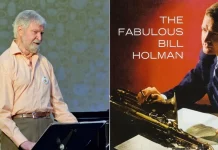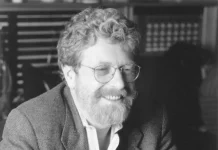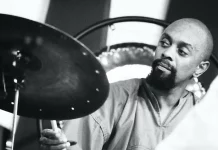The conductor, composer, pianist and TV “personality” André Previn, died at the age of 89 at his home in Manhattan, 28 February 2019. Equally at ease and accomplished in the worlds of classical and popular music and jazz, he established an international reputation as conductor of the London Symphony from 1968 to 1979, the Royal Philharmonic Orchestra from 1985 to 1988, the Pittsburg Symphony from 1976 to 1984, and the Los Angeles Philharmonic from 1985 to 1989. Nearing 70, he composed an opera, A Streetcar Named Desire, based on the play by Tennessee Williams, with a libretto by Philip Littell.
Initially regarded by some critics as a minor talent – a “Mickey Mouse maestro” – because of his ties to Hollywood where he arranged or composed music for dozens of films, he received four Academy Awards, 10 Grammys, and was nominated for three Oscars in 1961 for the scores for Elmer Gantry and Bells Are Ringing and the song “Faraway Part of Town” from the movie Pepe.
In the face of such dismissals he soon gained recognition as a dynamic and sensitive conductor (often compared with Leonard Bernstein), who through his TV programmes, recordings and concerts brought “serious” music, including the works of Vaughan Williams and Rachmaninov, to an audience of millions. Appearing on the Morecambe and Wise Christmas Special in 1971, Previn attempted to conduct an unruly Morecambe (who repeatedly addressed him as “Andrew Preview”) as the soloist in Grieg’s Piano Concerto. When a comically exasperated Previn told him “You’re playing all the wrong notes”, Morecambe’s memorable riposte was “I played all the right notes, but not necessarily in the right order”. Previn later recalled that in London “All the taxi drivers still call me ‘Mr Preview’”.
He also presented the popular André Previn’s Music Night on the BBC in the 1970s, and on one occasion spent an entire programme in 1974 discussing and playing jazz with Oscar Peterson. Marlon Brando later called this “one of the greatest hours I ever saw on television”.
In tandem with his classical career, Previn was a jazz pianist and leader of some distinction. He once said that “I never considered myself a jazz musician, but a musician who occasionally played jazz”. Given the quantity and quality of his many recordings, that modest statement is open to question.
He featured as a sideman on albums by Benny Carter (Swinging Kicks, 1957) and Barney Kessel (Music to Listen to Barney Kessel By, 1956, and Carmen, 1959). He also recorded a series of best-selling LP albums for the Contemporary label – Pal Joey, Gigi, My Fair Lady, West Side Story, King Size!, Like Previn!, André Previn Plays Songs by Vernon Duke, and André Previn Plays Songs by Jerome Kern, in the company of the prominent West Coasters Shelly Manne, Red Mitchell and Leroy Vinnegar. Moving to the Columbia label in the early 1960s, Previn with Herb Ellis, Ray Brown and Manne produced the excellent 4 To Go! album, with dazzling performances of “Oh, What a Beautiful Morning”, “Bye Bye Blackbird” and “Like Someone in Love”.
After a 12-year break (1967-1989) when he focused on conducting and recording classical as well as cross-over music including albums with Kiri Te Kanawa and Leontyne Price, Previn returned to jazz with the bassist David Finck on two splendid albums – We Got Rhythm: A Gershwin Songbook, and We Got It Good and That Ain’t Bad: An Ellington Songbook (1999). On the latter album, Previn offers nimble and inventive interpretations of “Take the ‘A’ Train”, ”Chelsea Bridge” and “Come Sunday”.
In a 1969 Gramophone interview on Ellington as a jazz composer, Previn commented approvingly that “Duke never sacrificed the melodic aspect of jazz for the purely rhythmic”. He also told critic Gene Lees: “Duke wasn’t just a songwriter. He was a genuine composer. There’s an enormous difference. Duke could have made an alliance with any of the great lyricists [but] never really bothered. With most of his songs, the words were set after he wrote them instrumentally”.
Born Andreas Ludwig Priwin on 6 April 1929 in Berlin, Previn escaped with his family from Nazi Germany in 1938 to California, where he became a US citizen in 1943. Growing up in Los Angeles, he learned English partly from attending movies, and after military service in the early 1950s concentrated on a career in classical music, succeeding Sir John Barbirolli in 1967 as music director of the Houston Symphony Orchestra, and then becoming music director of the Pittsburg Symphony Orchestra. Married (and divorced) five times, his wives included the actress Mia Farrow and the violinist Anne-Sophie Mutter.
Writing in 1992, critic Ted Gioia concluded that Previn, “long before his eventual retreat from most jazz activities had become something of a popularizer of jazz rather than a serious practitioner of the music. At his best, however, his music reflected a strong indigenous feel for the jazz idiom”.
Dizzy Gillespie was closer to the mark when he said of Previn the pianist and declared admirer of Art Tatum, Bill Evans and Oscar Peterson: “He has the flow, you know, which a lot of guys don’t have and won’t ever get”. In 1998 Previn paid tribute to his hero Leonard Bernstein who “made it possible not to specialize in one area of music. You no longer have to do just Broadway shows, or movies, or conduct – you can do any or all of them”.
The late Richard Cook delivered perhaps the most succinct and astute verdict on a multi-talented musician. “More than a dilettante, less than indispensable, Previn the jazzman is perhaps best heard as an interesting diversion”. To which one can only add “some diversion!”















